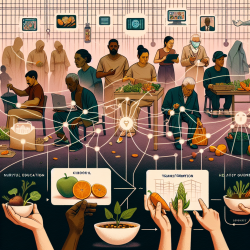Introduction
As professionals committed to improving the lives of children, it is crucial to understand the broader societal issues that can impact our work. One such issue is food and nutrition insecurity, particularly within justice-impacted populations. A recent study titled Determinants and Consequences of Food and Nutrition Insecurity in Justice-Impacted Populations provides valuable insights that can inform our practice and encourage further research.
Understanding the Issue
Justice-impacted populations face a disproportionately higher risk of food and nutrition insecurity. This stems from factors such as unemployment, housing instability, and social isolation, all of which are exacerbated by involvement with the corrections system. The consequences are severe, leading to increased risks of chronic and infectious diseases, depressive symptoms, and engagement in risky behaviors.
Key Findings
- High Prevalence of Food Insecurity: Among justice-impacted individuals, food insecurity rates are estimated between 70-91%.
- Health Consequences: Food insecurity is linked to depressive symptoms, lower self-reported health status, and HIV-risk behaviors.
- Barriers to Access: Structural issues in nutrition safety net programs and employment policies hinder access to healthy food.
Implications for Practitioners
Understanding these findings can help practitioners develop more comprehensive support systems for children and families affected by justice involvement. Here are some actionable steps:
- Advocate for Policy Change: Support policies that improve access to nutrition assistance and employment opportunities for justice-impacted individuals.
- Collaborate with Community Resources: Partner with local organizations to provide food security resources and support for families.
- Educate and Empower: Educate families about nutrition and available resources to empower them to make healthier choices.
Encouraging Further Research
The study highlights the need for continued research into the intersection of food insecurity and justice involvement. Practitioners are encouraged to contribute to this body of knowledge by conducting studies, sharing findings, and advocating for evidence-based policy changes.
Conclusion
By understanding and addressing the determinants and consequences of food and nutrition insecurity in justice-impacted populations, practitioners can play a pivotal role in improving outcomes for children and families. To read the original research paper, please follow this link: Determinants and Consequences of Food and Nutrition Insecurity in Justice-Impacted Populations.










